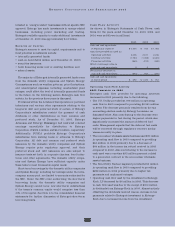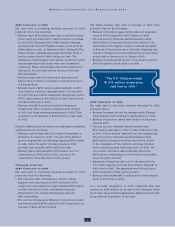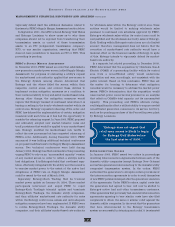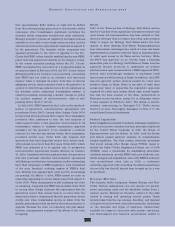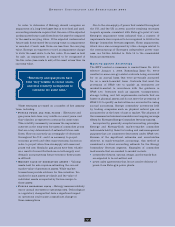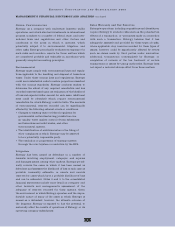Entergy 2003 Annual Report Download - page 42
Download and view the complete annual report
Please find page 42 of the 2003 Entergy annual report below. You can navigate through the pages in the report by either clicking on the pages listed below, or by using the keyword search tool below to find specific information within the annual report.
40
ENTERGY CORPORATION AND SUBSIDIARIES 2003
MANAGEMENT’S FINANCIAL DISCUSSION AND ANALYSIS
continued
vigorously defend itself. See additional discussion related to
this issue in FERC’s Supply Margin Assessment section below.
In September 2001, the LPSC ordered Entergy Gulf States
and Entergy Louisiana to show cause as to why these
companies should not be enjoined from transferring their
transmission assets, or control of those transmission
assets, to an ITC (independent transmission company),
RTO, or any similar organization, asserting that FERC
does not have jurisdiction to mandate an ITC or RTO. This
proceeding is pending.
FERC’SSUPPLY MARGIN ASSESSMENT
In November 2001, FERC issued an order that established a
new generation market power screen (called Supply Margin
Assessment) for purposes of evaluating a utility’s request
for market-based rate authority, applied that new screen to
the Entergy System (among others), determined that
Entergy and the others failed the screen within their
respective control areas, and ordered these utilities to
implement certain mitigation measures as a condition to
their continued ability to buy and sell at market-based rates.
Among other things, the mitigation measures would
require that Entergy transact at cost-based rates when it is
buying or selling in the hourly wholesale market within its
control area. Entergy requested rehearing of the order, and
FERC has delayed the implementation of certain mitigation
measures until such time as it has had the opportunity to
consider the rehearing request. In June 2003, FERC proposed
and ultimately adopted new market behavior rules and
tariff provisions that would be applied to any market-based
sale. Entergy modified its market-based rate tariffs to
reflect the new provisions but has requested rehearing of
FERC’s order. Additionally, during December 2003, FERC
announced it was holding additional technical conferences
on proposed modifications to its Supply Margin Assessment
screen. Two technical conferences were held during
January 2004. Entergy has filed comments in this proceeding
urging FERC to rely on an “uncommitted capacity” version
of any market screen in order to reflect a utility’s native
load obligations. It is Entergy’s belief that cost-based regu-
lation effectively mitigates both the ability and the incentive
to exercise market power to the extent of the native load
obligations. A FERC rule on Supply Margin Assessment
could be issued by the end of March 2004.
Separately, Entergy-Koch Trading filed its triennial
market power update on January 26, 2004. Three market
participants intervened and urged FERC to reject
Entergy-Koch Trading’s triennial update and terminate
Entergy-Koch Trading’s, the domestic utility companies’,
and their affiliates’ market-based rate authority for sales
within the Entergy control area unless and until adequate
mitigation measures have been implemented. If FERC were
to revoke Entergy-Koch Trading’s, the domestic utility
companies’, and their affiliates’ market-based rate authority
for wholesale sales within the Entergy control area, these
entities would be limited to making wholesale sales
pursuant to cost-based rate schedules approved by FERC.
Entergy’s wholesale sales within its control area could be
cost-justified and the wholesale electricity sales of Entergy-
Koch Trading within Entergy’s control area are of a limited
amount; therefore, management does not believe that the
revocation of market-based rate authority would have a
material effect on the financial results of Entergy. In spite
of this, Entergy intends to vigorously defend its market-
based rate authority.
In a separate, but related proceeding, in December 2003,
FERC determined that the acquisition by Oklahoma Gas &
Electric (OG&E) of a generating facility within its control
area from a non-affiliated entity would undermine
competition and was, accordingly, not consistent with the
public interest. Based on this conclusion, FERC then set
the matter for hearing to determine what mitigation
remedies would be necessary to address the market power
issues. FERC’s determination that the acquisition would
raise market power concerns was premised on an analysis
that relied on OG&E’s total capacity, not its uncommitted
capacity. This proceeding, and FERC’s ultimate ruling,
could significantly affect a utility’s ability to acquire needed
non-affiliated generation resources in its service territory,
such as the pending purchase of the Perryville power plant
by Entergy Louisiana.
INTERCONNECTION ORDERS
In January 2003, FERC issued two orders in proceedings
involving Interconnection Agreements between each of the
domestic utility companies (except Entergy New Orleans)
and certain generators interconnecting to the domestic utility
companies’ transmission system. In the orders, FERC
authorized the generators to abrogate certain provisions of
the interconnection agreements in order to avail themselves
of new FERC policies developed after the generators’ execution
of the agreements. Under FERC’s orders, capital costs that
the generators had agreed to bear will now be shifted to
Entergy’s native load and other transmission customers.
Other generators that previously had executed interconnection
agreements agreeing to bear similar costs have also filed
complaints to obtain the same or similar relief against the
domestic utility companies. In the event that the generators
that have interconnected to the Entergy transmission
system are successful in obtaining such relief, it is estimated
“Entergy does not expect that
retail open access is likely to begin
for Entergy Gulf States before
the first quarter of 2005.”



